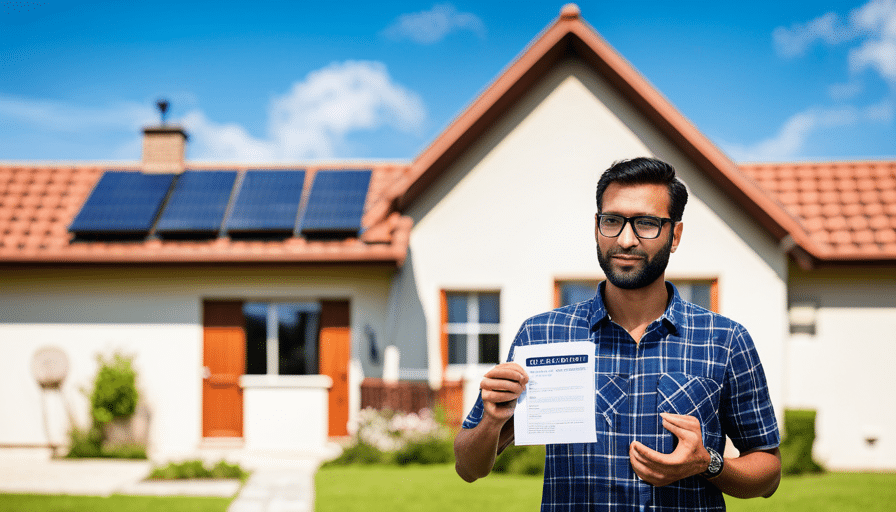In recent years, off-grid solar systems have become increasingly popular as a way to reduce reliance on traditional power grids and lower carbon footprints. However, deciding whether an off-grid solar system is the right choice for your energy needs can be a challenging process.
There are various factors to consider, from assessing your energy needs and evaluating your location to budgeting for the installation and choosing the right components.
This article aims to provide guidance on whether an off-grid solar system is right for you by outlining the key considerations for making this decision. By understanding the fundamentals of off-grid solar systems, and assessing your own energy needs and location, you can make an informed decision about whether to go off-grid.
We will also outline the budgeting and component selection process to ensure that your off-grid solar system meets your energy needs and is a cost-effective and sustainable investment.
Understanding Off-Grid Solar Systems
Off-grid solar systems are self-contained power generation systems that function independently of the electrical grid and provide electricity to households and communities in areas where grid power is not available or inconsistent. These systems are typically composed of photovoltaic (PV) panels, batteries, charge controllers, and inverters.
Off-grid solar systems have several benefits, including the ability to provide reliable power in remote locations, reduce dependence on fossil fuels, and reduce energy costs over time. Despite their advantages, off-grid solar systems also have some limitations.
The initial cost of installation can be high compared to grid-connected systems, and the size of the system required to meet a household’s energy needs can be substantial. Additionally, off-grid solar systems require proper maintenance to ensure their long-term performance, and batteries can degrade over time, reducing their storage capacity.
Off-grid solar systems are an excellent option for those who live in remote areas without access to the electrical grid or who want to reduce their dependence on fossil fuels. However, anyone considering an off-grid solar system should carefully evaluate their energy needs, the cost of installation, and the maintenance requirements of the system before making a decision.
Overall, off-grid solar systems present a viable solution for those who seek greater energy independence and sustainability.
Assessing Your Energy Needs
Assessing the amount of energy required to power one’s daily activities is a crucial step in determining the feasibility, cost, and reliability of relying solely on renewable energy sources. To assess your energy needs, you need to calculate your current energy usage.
Energy usage varies from household to household and is dependent on several factors such as the number of people in the household, the size of the house, and the types of appliances used. To calculate your energy usage, you can conduct an energy audit.
An energy audit is an assessment of your home’s energy efficiency and consumption. It involves analyzing your energy bills, inspecting your home’s insulation, and identifying areas of energy wastage. An energy audit can be conducted by a professional or a DIY approach can be used.
Once you have identified your energy usage, you can then determine the size of the solar system you will need to meet your energy needs. It is essential to have a realistic understanding of your energy needs before investing in an off-grid solar system.
Overestimating or underestimating your energy needs can result in a system that is either too small, which may not meet your energy needs, or too large, which can be costly. Accurately assessing your energy needs can enable you to make informed decisions when selecting the size of your off-grid solar system.
Evaluating Your Location
Geographical location is a critical factor to consider when evaluating the feasibility of relying solely on renewable energy sources, particularly for off-grid solar systems. The location of your property can impact the amount of sunlight your solar panels receive, which can affect the amount of energy your system generates.
It is important to evaluate your location’s solar potential by considering factors such as latitude, elevation, shading, and the availability of clear skies. When evaluating your location for off-grid solar, the placement of solar panels is also essential. The layout and orientation of your solar panels will determine their exposure to sunlight and, in turn, the amount of energy they can generate.
In general, solar panels should be placed in a location that maximizes their exposure to sunlight, which is typically on a south-facing slope with minimal shading. Additionally, it is important to consider the distance between your panels and your home, as this can affect the efficiency of your system and the cost of installation. Weather patterns can also impact the feasibility of off-grid solar energy in your location.
Areas with high levels of cloud cover, frequent rain, or snowfall may not be ideal for solar energy systems. It is important to evaluate the weather patterns in your location to determine the expected amount of sunlight and whether your system can generate enough energy to meet your needs. In some cases, it may be necessary to supplement your solar energy system with other renewable energy sources or a backup generator to ensure reliable power.
Budgeting for Off-Grid Solar
One important aspect to consider when transitioning to renewable energy sources is creating a budget that takes into account the costs associated with installing and maintaining an off-grid solar system. The initial cost of setting up an off-grid solar system can be significant, as it involves purchasing solar panels, batteries, inverters, charge controllers, and other equipment. Additionally, the installation cost can vary depending on the complexity of the system and the location.
Cost analysis is a crucial step in determining whether off-grid solar is a viable option for you. It is essential to consider the long-term savings that come with generating your own electricity and the potential increase in the resale value of your property. Evaluating your energy needs and creating a realistic budget can help you make an informed decision about whether off-grid solar is the right choice for you.
Financing options are also an important factor to consider when budgeting for off-grid solar. There are various financing options available, including loans, grants, and incentives that can help offset the upfront costs of installation. It is essential to research and compare different financing options to determine which one best suits your financial situation and energy needs.
By creating a budget and exploring financing options, you can make an informed decision about whether off-grid solar is a feasible and sustainable energy solution for you.
Choosing the Right Components
Selecting appropriate equipment is crucial in ensuring the efficiency and reliability of an off-grid solar system. The components of an off-grid solar system include solar panels, batteries, charge controllers, and inverters. The quality of the components is an important factor to consider when choosing the right equipment.
Component quality is one of the most important factors to consider when selecting equipment for an off-grid solar system. High-quality components are more efficient, reliable, and durable than lower quality components. Investing in high-quality components may cost more upfront, but it can lead to significant long-term savings. Cheaper components may require more frequent maintenance, replacement, and repairs, which can be costly and time-consuming.
The installation process is also an important factor to consider when choosing the right components for an off-grid solar system. The installation process should be done by a qualified and experienced professional to ensure that the system is installed correctly and safely. An improperly installed system can lead to reduced efficiency, damage to the equipment, and potential safety hazards.
It’s important to do thorough research, read reviews, and ask for recommendations before selecting an installer to ensure that the installation process is done correctly.
Making the Decision to Go Off-Grid
When considering transitioning to a self-sustaining energy system, it is important to evaluate the practicality and potential benefits of going off-grid.
One important aspect to consider is weighing the pros and cons of such a decision. Going off-grid can provide energy independence and a sustainable lifestyle, but it requires a significant investment in equipment and may require lifestyle changes.
It is essential to research and understand the costs and benefits of going off-grid. While the initial investment may be high, the long-term savings and benefits can outweigh the costs. However, it is important to note that going off-grid requires a significant lifestyle change, as energy consumption must be carefully monitored and managed. This includes reducing energy usage and choosing energy-efficient appliances.
Making the decision to go off-grid requires careful consideration of the practicality and potential benefits. This includes weighing the pros and cons of such a decision, as well as making necessary lifestyle changes.
While the initial investment may be high, the long-term benefits of energy independence and sustainability can make going off-grid a practical and worthwhile choice for those willing to make the necessary adjustments.
Frequently Asked Questions
How long does it typically take to install an off-grid solar system?
The installation time for an off-grid solar system depends on various factors such as the size of the system, the complexity of installation, and the availability of resources. The cost of the system also affects the installation time, as more expensive systems may require longer installation times due to the need for more advanced equipment and expertise. Therefore, it is difficult to provide a specific timeframe for the installation of an off-grid solar system without considering these factors.
Are there any government incentives or tax credits available for installing an off-grid solar system?
There are government incentives and tax credits available for installing off-grid solar systems. These incentives vary by location and may include rebates, grants, and tax credits. Off-grid solar can be affordable with these incentives.
Can an off-grid solar system be used to power large appliances like air conditioners or electric water heaters?
Off-grid solar systems can power large appliances like air conditioners and electric water heaters, but limitations exist. Battery storage capacity and panel output must be sufficient for the appliance’s energy needs, and energy conservation practices must be implemented to avoid exceeding system capacity.
How do I maintain and troubleshoot an off-grid solar system?
To maintain and troubleshoot an off-grid solar system, a regular maintenance schedule is essential, including checking battery levels and cleaning solar panels. Troubleshooting techniques involve identifying and resolving issues with inverters, charge controllers, and wiring using technical expertise and diagnostic tools.
Will I need to replace any components of my off-grid solar system over time, and if so, how often?
The Off-grid solar component lifespan differs depending on the type of component, and maintenance requirements are necessary to ensure optimal performance. Choosing the right battery for your off-grid solar system is crucial as it is a component that requires replacement every 5-10 years.
Conclusion
Off-grid solar systems are becoming increasingly popular among homeowners who want to reduce their dependence on the traditional grid. However, before making the decision to go off-grid, it is essential to assess your energy needs, evaluate your location, and budget for the installation. Additionally, choosing the right components is crucial for ensuring that your off-grid solar system operates efficiently and effectively.
When considering off-grid solar systems, it is important to understand that they require an initial investment and ongoing maintenance. However, the long-term benefits of reducing your carbon footprint and achieving energy independence can outweigh these costs. It is also important to note that off-grid solar systems may not be the best option for everyone, depending on individual energy needs and location.
In conclusion, determining whether off-grid solar is right for you requires careful consideration of various factors, including energy needs, location, budget, and component selection. With the right approach and investment, off-grid solar systems can offer significant benefits for homeowners seeking energy independence and reduced reliance on traditional grids. However, it is important to conduct thorough research and seek advice from professionals before making the decision to go off-grid.


